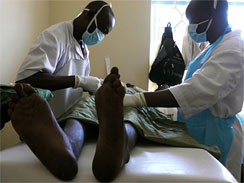 |
| The beauty of African art at the exhibition by Design Clan |
The Design Clan, composed of Interior Design students, on Wednesday March 3rd treated students to an array of art as they displayed diverse pieces of art at the Students’ Centre.
Ranging from mosaic, bead work, pieces to fabric paintings, graphic images, basic photography and house and other interior design art works, the exhibitors meticulously displayed their art pieces on the walls and on tables, that captivated observers who went round and appreciation the beauty of art amidst soft background music.
I arrived early at the varsity students center to capture and mavel at the talent with other students.
“The main aim of the exhibition is to expose designers to their potential clients and show what is available in the design department.” said the current design clan chairman Arnold Wangai, a third year Interior Design student.
The entrance was free though exhibitors were charged Kshs 50 to display their pieces and make sales.
Walter Mbaka's fine art pieces like Money Matters of a 1,000 shillings note, Kiss about kissing couples and the Leopard ready to pounce drew most of the students' captivated by the great creativity with pencil and paper.
“I am always inspired by posture and emotion of happiness. My art always seek to freeze emotion” Said Walter. Speaking to The Burning Splint, he said his works have also been exhibited at Unatrust gallery in Kisumu and they go for about Kshs 500-5000.
Making a piece of art is time consuming as students have to work with limited materials mostly sourced from Kisumu, tight time schedule and in the crowded hostels.
“It is the joy I get from the art that drives me. The challenges are always overcome by this joy,” Said Ahmed Bini who exhibited Bismillahi a mosaic of egg shells and wood drawn in arabic as a morning prayer.
The same sentiments were aired by Mary Negesa, a first year student and many other artists,
Most artists interviewed by The Burning Splint said the most daunting challenge is getting materials.
Nancy Moraa, third year who sell her pieces between Kshs 1,500-2,500 said she looks for 'trash' like bamboo leaves, egg shells and old newspapers as materials. Always after this hustle an artist becomes emotionally attached to the art to let it go.
On the other hand, Victor Odongo on his models Homestead, an upmarket home and Bedroom 2, a single lady's room used simple materials. The artist used old card box, utensil rag and crayon in production.
“I just get my inspiration from objects like a rotting log and see how to make them useful.” said Nancy.
Two third year students Anthony Sissey and Josphat Kimani have opted to using computer software to produce artwork. This new form of art was being displayed by a laptop.
“As art appreciation by students is low because of their low economic status I opted to designing postures, business card and printing of T-shirts to make ends meet,” Said Sissey who sells his postures from Ksh. 300 and uses Adobe photoshop and illustrator software.
Perhaps, the most intriguing piece was Kenyatta and Dedan showing the first Kenyan president Jomo Kenyattaa and freedom fighter Dedan Kimathi in prison. The printed fabric showed the two are behind a barbed a wire in a British colonial prison.
“My main aim was to make the audience remember about our independence,” Said Emma Njoki, who funnily enough is inspired by the curve a woman's body.
Worth mentioning too were the photograph work by Kimani Josphat, Jennifer Kivuitu amongst others. The works Environmental Psychology and Introduction to Photography were a masterpiece with powerful; photographs beautifully outlined.
Published on Equator Weekly (March 7-14, 2010) and The Oracle (2009/10) both publications of Maseno University/Kenya














